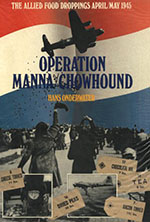
Operation Manna/Chowhound
Hans Onderwater did a wonderful job in preserving the history of the Manna drop and it was only through his collection of photographs and much of his researched details in his book (illustated) that I have been able to add the details of 460 squadron involvement in this wonderful operation, saving so many Dutch people from starvation in those grim days of early 1945.
The information which Hans gathered made it possible for the 460 squadron participant members to meet up with the Netherlands Ambassador, Dr Hans Sondaal at his special luncheon at the Dutch Embassy at the Camberra Commemorative Gathering 3rd December, 2003.
A great thank you, to Hans Onderwater, for preserving this history and thank you Hans for allowing its use on this web site.
Foreword
As an Air Commodore responsible for the Operations and Plans of the Second Tactical Air Force RAF from April 1, 1943 until VE–day, I experienced many mixed feelings when dealing with the variety of widely conceived plans which had to be turned into successful operations. In detail, every operation had its lethal aspect with the horrible underlying question which had to be considered in each case – 'Can we ensure that this operation will kill more of the enemy than of our own people?' The on exception where this question did not apply, as far as I can remember, was Operation Manna; the Allied dropping emergency rations from the air with the positive expectation that about 3,500,000 of our friends in the Netherlands could be saved from almost certain death by starvation.
Apart from the actual arrival of the "Manna" from heaven, dropped by the RAF and USAAF, the air–drops meant that those of our friends who were so forlorn and starving in enemy occupied territory were able to see the Allied aircraft flying low and unhindered over their land, thus conveying to them the life–giving promise that freedom was very close.
I have been thankful that I was able to play a humble part in organizing the drop–zones throughout the occupied part of the Netherlands, to provide a wide range of dropping places by overcoming with facts and figures the objections the Germans tried to make against their use. To me 'Operation Manna' was a worthwhile and as historically important as the D–Day invasion, especially since we had so very little time to lay on the operation.
With respect, great credit is due to His Royal Highness Price Bernhard of the Netherlands, who was the 'linch–pin' of the very complex organization involved in getting the foodstuffs delivered from the airfields to the actual distribution points in the occupied territory. Many Netherlanders should be grateful to him for his enthusiasm and sense of urgency which inspired us all to save their parents and grandparents who survived those dreadful months in 1945.
'Roseland', Seaford
Andrew James Wray Geddes
Commodore CBE, DSO
Legion of Merit (USA), RAF (retd)
No agreement had yet been signed when the first Lancasters approached Occupied Holland. At an extremely low altitude of 105–1,000 feet the large four–engined bombers would have been an easy prey for the may anti–aircraft guns the Germans could still deploy in the besieged Fortress Holland. Even if the Germans had opened fire and killed hundreds of young Britons and other Allies, they would have had the right to do so. The responsible commanders of the RAF know the risk they took, know the terrible tragedy that could have happened over Holland if the Germans had opened fire. Above all they know that any German reaction would be legitimate. The commanders knew it; so did the pilots and their crew members…